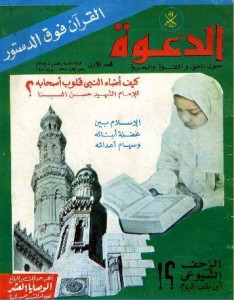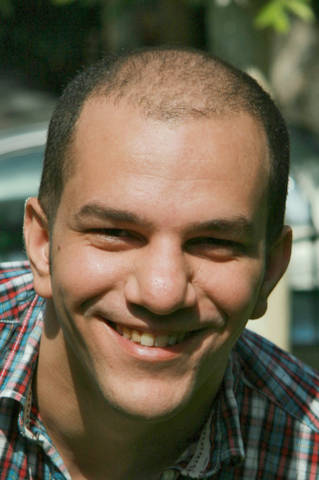News of revolution (part III): Televising the life and death of an Egyptian president
By Osama Diab
Anwar Sadat was the first Egyptian leader to exploit television's propaganda power – and even his assassination was unwittingly televised.
Saturday 3 November 2012
Part I: How the nascent print media gave birth to Egyptian nationalism
Part II: Voice of the Arabs or Nasserist mouthpiece?

In 1970, President Gamal Abdel-Nasser died and with him the dream of uniting the Arab world from the “ocean to the gulf” under his leadership. However, despite the humiliating defeat of 1967, Nasser died as a popular, yet wounded, leader and his extremely emotional funeral – which was attended by at least five million in Cairo alone, not to mention all the mourners who poured on to the streets of cities across the Arab world – was one of the largest in history.
Initially regarded as a weak leader and an interim figurehead until Nasser's “true successor” emerged, Anwar Sadat was quick to try to establish himself as the undoubted leader of Egypt by carrying out a self-described “corrective revolution” which involved pursuing and purging what he called “marakiz al-qowa” (“centres of power”) who were believed to be pro-Soviet and loyal to Nasserist ideology.
On 15 May 1971, Sadat announced that more than a 100 “centres of power” had been charged with plotting a coup to overthrow him. Continuing this trend of overturning Soviet influence, Sadat took a landmark decision in 1972 to expel the Soviet military advisors from Egypt. After fighting the October War against Israel in 1973, Sadat continued his aggressive reforms by opening up Egypt's state-run command economy to private enterprise and engaging in peace negotiations with Israel which started in earnest with his historic visit to Jerusalem in 1977 and culminated with the signing of the 1979 Egyptian-Israeli peace treaty.
Throughout the 1970s, Egypt gradually shifted its orientation from the East to the West — the former rivals of Egypt during the Nasser era — and broke off relations with Nasser's Soviet allies. This new policy direction was accompanied by a relative openness in the political climate and the incorporation of the principles of liberal democracy in Egypt's official discourse. The aggressive liberalisation of the economy and remarkable change in foreign policy required a new type of national narrative, especially when the Arab world decided to isolate Egypt after Sadat extended the hand of peace to Israel, the Arab world's then-official enemy.
Mahmoud Shalabieh, the Jordanian media scholar, argues that, although radio was utilised by Sadat in the same way it was by Nasser, to publicise his policies and persuade the nation their merits, Sadat possessed a powerful new media weapon: television. Shalabieh argues that television influenced the way Sadat and then-Israeli Prime Minister Menachem Begin behaved during the peace talks. “By knowing that the whole world was watching, they seem to have been self-conscious about the long-lasting effect they were creating by engaging in these peace talks,” Shalabieh argues.
However, television, even more so than the press, was under Sadat's total control. The 1970s could be described as the decade of television and the press, while Nasser's favourite medium, radio, experienced a relative decline. As it became more affordable and its reach spread to every corner of the country, television replaced radio as the main tool for propaganda. In a way, TV also suited Sadat's extroverted personality and his love of basking in the spotlight.
Sadat focused more on Egyptian affairs as opposed to Arab issues, and asserted that Egypt was his first responsibility. According to Shalabieh, he adopted “Egyptian patriotism” as the major value of Egypt's foreign policy, a far cry from Nasser's assertion that Egypt's main responsibility and focus was to the Arab world. This brand of nationalism, often referred to as “Pharaonism”, was not new at the time, but had reached its peak during Egypt's liberal era, after its official independence in 1921 and up until 1952.
Sadat was very aware of the power of television as a medium to express his fury against Egypt's suspension from the Arab league. In a televised speech before the parliament in the last days before his assassination, Sadat sent a clear Egypto-centric message to Egypt's one-time Arab “brothers”: “We are the origin of the Arabs. Hagar, the wife of Abraham, is the mother of Ismael, the ancestor of the Arabs. Hagar is Egyptian. So if there is someone out there who wants to belong, they should belong to Egypt, not Egypt to them. There is no point in these debates about whether we belong to the Pharaohs or not. Our blood is Arab and we are the origin of the Arabs and they belong to us.”
Adeed Dawisha, an Iraqi scholar who wrote extensively on Arab nationalism, explained: “Given the inherent strength of this feeling of ‘Egyptianism', it was hardly surprising that Abdel-Nasser's successor, Anwar Sadat, would use it in order to escape the overbearing legacy of his towering predecessor.” He explains that Sadat began by changing Nasser's name for Egypt, the United Arab Republic, to the Arab Republic of Egypt, “where ‘Arab' is only the adjective and ‘Egypt' is the noun.”
“Simultaneously, Sadat embarked on a policy of cultural reorientation toward Egypt. This was evident in subtle changes in school curricula, highlighting Egypt's long history, cultural prominence, and unique personality. The government-controlled media similarly spotlighted Egypt's prestige and status in international affairs. By the end of the 1970s, Egyptian nationalism had won the day in Egypt,” observes Dawisha.
The press also played an important part in shaping this era and in telling us its story. As Sadat wished to give his liberal reforms a democratic and pluralistic sheen, a partisan press was allowed to form, and was partly tolerated, as an outcome of the Political Parties Law of 1977. Sadat initially allowed three parties to form representing the left, the centre and the right. The first partisan newspaper to be launched was al-Ahrar, which belonged to what Sadat decided to be Egypt's rightwing party.
In addition, the tolerated-but-banned Muslim Brotherhood was allowed in 1976 to publish a monthly magazine al-Da'wa (The Call to Islam). The Brotherhood's publication was very critical of Arab nationalism, communism and secularism, and this, some believe, served the goal of a Sadatist state that was more troubled by Nasserism and left-wing ideologies than with pan-Islamism.
The magazine's cover, which is often indicative of what a publication stands for, had headlines such as “The Qur'an is above the constitution”, “Islam between the slumber of its followers and the attacks of its enemies”, “Where will the encroachment of communism lead?”. These topics were more or less the main themes of the magazine until it was shut down in 1981.
The Sadat-Brotherhood alliance began to sour after the peace treaty and when his regime began to obstruct the student movement which was openly backed by the Brotherhood. The Brotherhood did not escape the massive crackdown on dissent and arrests Sadat ordered before his assassination as his popularity in a desperate bid to salvage his plummeting popularity and his increasingly shaky grip on rule.
Although Sadat utilised different forms of media to propagate the country's new, supposedly open political line, the insecurity he felt towards the end of his rule led him to abandon his promise of pluralism and greater freedoms. Many writers, politicians and journalists who opposed him were imprisoned and more restrictive measures were imposed on the media.
Despite this, the relative openness of the political climate compared with the Nasser era, meant that the Sadatist discourse received some competition from other non-official nationalist narratives, such as the struggling pan-Arabism and the emerging pan-Islamism. However, Sadat believed that these attempts were only operating in a margin of freedom he himself and so posed no threat to his rule.
In this, as hindsight reveals, Sadat was clearly wrong, as demonstrated by his assassination during the 8th celebration of the October War, in 1981, at the hands of Islamic militant groups who succeeded in infiltrating the military. Interestingly, Sadat was not only the first Egyptian leader to exploit the power of TV, but he became the only Egyptian leader whose death was televised.
But Sadat's assassination failed to kill off his policies. Although some areas, especially in Upper Egypt, fell under the temporary control of militant Islamic groups after his death, the attempt to overthrow Sadat did not succeed in establishing a new Islamist order. Sadat's successor Hosni Mubarak can now be seen in retrospect, especially in his early years, as having maintained and extended Sadat's policies and official nationalist discourse, despite his success in bringing Egypt back into the Arab fold and his decision to release most of his predecessor's political prisoners.
Egypt's alliance with the West, peace with Israel, the façade of democratisation masking his dictatorial regime and the emphasis on Egyptian nationalism remained intact throughout most of Mubarak's 30-year-long rule, which eventually brought about an unprecedented level of corruption, nepotism and inequality, at least in Egypt's republican era.
This is the third part in a series of articles exploring the role of the media in shaping Egypt's modern national consciousness and Egyptian nationalism, as well as fomenting revolution. Part I focused on the role of the nascent print media in shaping Egyptian nationalism and national identity in the 19th century. Part II dealt with Nasser's use of radio to propagate his pan-Arabist ideology.
Part IV will deal with satellite television, the internet and the explosion of independent media, as well as how Egypt's new rulers, the Muslim Brotherhood, despite decades of opposition, are largely continuing the Sadat-Mubarak line.
—


